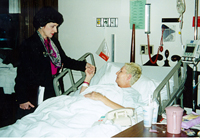by Michelle Holloman, MSW, and Gale Horinbein, MSW
 Inpatient
social worker Carol Jaskunas spends a lot of visiting her patients within
the hospital.
Inpatient
social worker Carol Jaskunas spends a lot of visiting her patients within
the hospital.
Like many helping professions, the work accomplished by social workers often goes unrecognized.
The National Association of Social Workers (NASW) initiated National Professional Social Work Month in 1962 as a time to honor social workers in addition to raising public awareness about the social work profession.
In 1984, president Ronald Reagan officially designated March as Social Work Month and the NASW uses this month to kick-off a year-long public service campaign to foster understanding of the social work profession.
Each campaign focuses on a current issue facing the American people. The last three have focused on hate crimes and ways where others can help prevent violence.
This year's theme is: The Business of Social Work: Helping People Help Themselves.
Local celebrations for Social Workers Month included: Elizabeth McCaleb, MSW and Charline Pinckney, MSW, conducted a presentation on homelessness as part of the social work grand rounds. The Department of Outcomes Management, Research and Development hosted a luncheon honoring inpatient social workers. And MSW representatives recently conducted a poster presentation on MUSC Social Work Services at the S.C. Chapter of the NASW Annual Conference in Columbia.
Social workers are trained professionals who hold bachelors, masters or doctoral degrees in social work.
The areas of practice are varied including medical care facilities, family service agencies, employee assistance programs, schools, businesses, nursing homes, the judicial system as well as private practice settings.
Many problems or issues are addressed by social workers including substance abuse, family conflict, domestic violence, workplace tension, health-related problems, disabilities, mental illnesses, inadequate food or housing, poverty and many other biopsychosocial issues.
The focus of social work intervention is with individuals, families or groups and also include public policy, administration, research, community organization and advocacy.
MUSC and UMA employ about 43 professional social workers representing inpatient, outpatient and psychiatric areas throughout the center. All are degreed professionals that have met the stringent requirements of licensure or certification as set forth by the Social Work Board of Examiners. As professional social workers, they are bound by the Social Work Code of Ethics and strive to provide the most effective service to their client population.
Each clinic or unit is assigned a social worker to provide biopsychosocial assessments, develop interventions and provide therapeutic services as indicated. Other areas with which social work is involved is the transition of care when discharged from one service area to another or from one setting to another.
In all of their efforts, the professional social work staff of MUSC and UMA serves the institution and their community to the best of their ability and often times, far and beyond their call of duty.
For more information on social work assistance, contact: Inpatient Social Work: 792-9535 Outpatient Social Work: 876-0587 IOP Social Work: 792-9888
The Truth About Social Workers: Fact or Myth?
- Myth: A person must see a psychologist or psychiatrist to receive therapy.
- Fact: Professional social workers provide half of the nation's mental health services.
- Myth: Most social workers are employed by the public welfare system, child welfare system or the government.
- Fact: Only one percent of the members of the NASW work in public welfare and only about one quarter of all child welfare (child protection) cases are handled by professional social workers. In addition, fewer than one-third of all professional social workers work for federal, state or local governments.
- Myth: All Department of Social Service (DSS) employees, caseworkers and volunteers are professional social workers.
- Fact: Someone is considered a professional social worker only if they have a degree in social work from an accredited college or university and are licensed/certified by the state in which they practice. Professional social workers are not exclusively child protective service or food stamp/welfare eligibility workers although some may be employed in these settings.